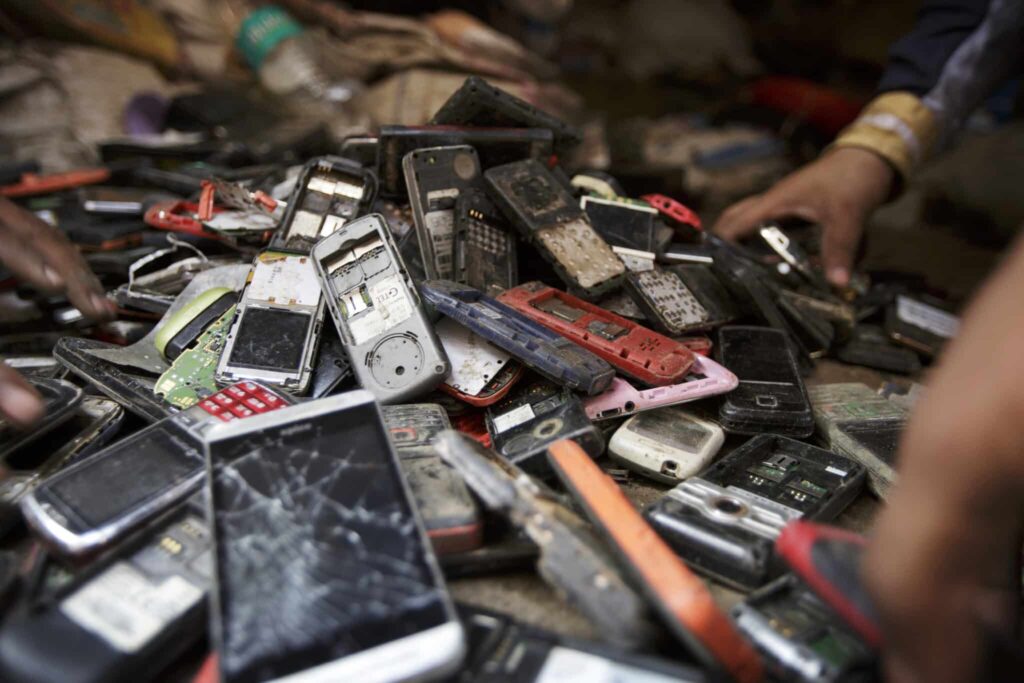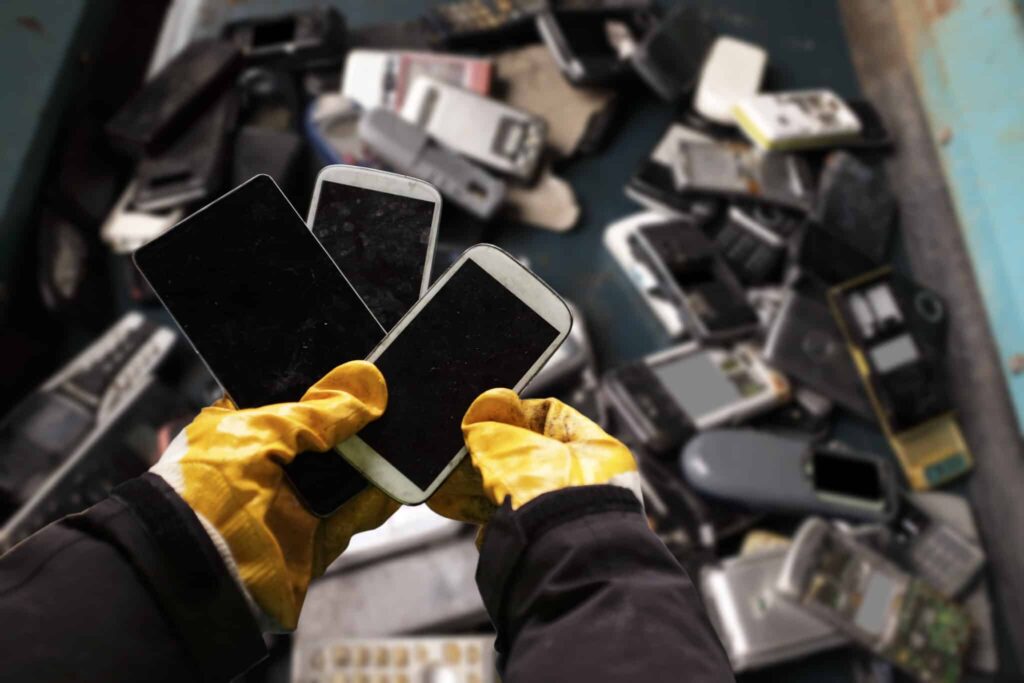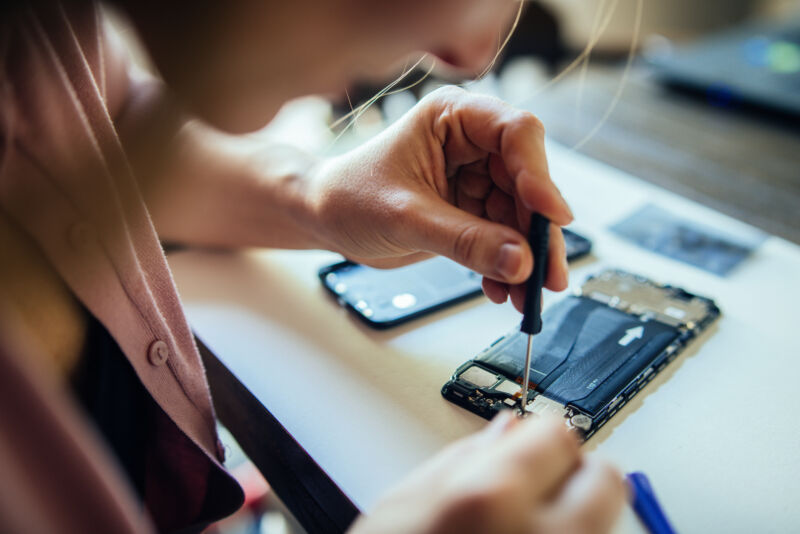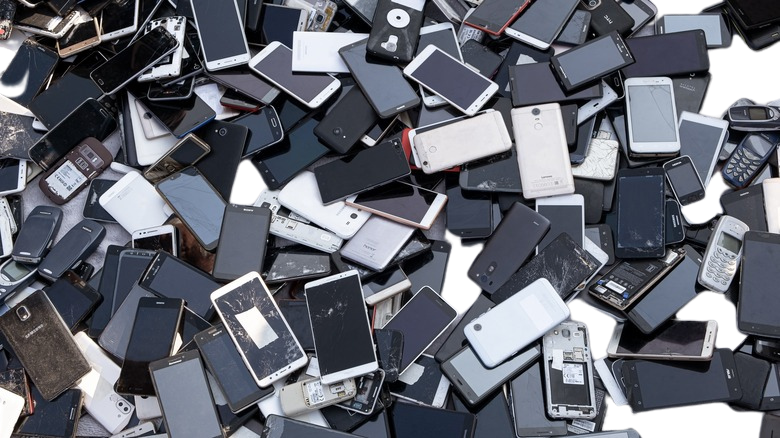The Growing Problem of E-Waste and the Importance of Recycling Cell Phones

In today’s digital age, the rapid turnover of electronic devices has led to a significant rise in electronic waste (e-waste). Among the most frequently replaced items are cell phones, which contribute substantially to the growing e-waste problem. Every year, millions of cell phones are discarded, many of which end up in landfills, causing severe environmental damage. The importance of cell phone recycling cannot be overstated, as it not only helps mitigate the harmful effects of e-waste but also promotes the recovery of valuable materials.
“In 2022, over 5.3 billion mobile phones will be thrown away, contributing significantly to the global e-waste problem“ (EcoWatch) (RNZ).
The Benefits of Cell Phone Recycling, Options for Recycling, and How to Do It Responsibly
This blog post will guide you through the essential aspects of cell phone recycling. You will learn about the significant benefits of recycling your old cell phones, the various options available for doing so, and the steps you can take to ensure responsible recycling. By the end of this post, you will be equipped with the knowledge to make environmentally conscious decisions regarding your old technology.
The Importance of Cell Phone Recycling
E-Waste Statistics: The Volume of Cell Phones Discarded Annually
The statistics surrounding e-waste are staggering. According to recent studies, approximately 53.6 million metric tons of e-waste were generated globally in 2019, with cell phones comprising a significant portion of this figure (World Health Organization). In the United States alone, it is estimated that over 150 million cell phones are discarded each year (KPBS). These numbers highlight the urgent need for effective cell phone recycling practices to combat the growing e-waste crisis.
Environmental Impact: The Harmful Effects of Improper Disposal
Improper disposal of cell phones poses severe environmental risks. When cell phones are thrown away in landfills, they can release toxic substances such as lead, mercury, and cadmium into the soil and water, contaminating ecosystems and posing health hazards to humans and wildlife. Furthermore, the plastic components of cell phones can take hundreds of years to decompose, contributing to long-term environmental degradation. Recycling cell phones helps prevent these harmful effects by ensuring that toxic materials are safely managed and that reusable components are recovered.
Resource Recovery: Valuable Materials That Can Be Recovered Through Recycling
Cell phone recycling not only mitigates environmental harm but also enables the recovery of valuable materials. Cell phones contain precious metals such as gold, silver, and palladium, as well as rare earth elements like neodymium and dysprosium. These materials are essential for manufacturing new electronics and other high-tech products. By recycling old cell phones, these valuable resources can be reclaimed and reused, reducing the need for mining and conserving natural resources. Additionally, recycling helps decrease the energy consumption and carbon footprint associated with producing new devices from raw materials.
In summary, cell phone recycling plays a critical role in addressing the e-waste problem, protecting the environment, and recovering valuable resources. By understanding the importance of recycling and taking responsible actions, we can all contribute to a more sustainable future.
How to Recycle Your Old Cell Phone

Manufacturer Programs: Major Manufacturers Offering Cell Phone Recycling Programs
Many major manufacturers have established cell phone recycling programs to help reduce e-waste and promote sustainability. These programs make it easy for consumers to return their old devices for recycling or refurbishing. Here are some notable programs:
- Apple: Apple’s Recycling Program allows customers to return any Apple device for free recycling. They also offer trade-in options where customers can receive credit towards a new purchase.
- Samsung: Samsung’s Take-Back and Recycling Program provides free recycling for all Samsung-branded products. They also offer a trade-in program for eligible devices.
- Google: Google’s Recycling Program enables users to recycle their old Google devices for free.
- Monmouth Wire Computer Recycling: Monmouth Wire Computer Recycling provides comprehensive electronics recycling services, ensuring proper disposal and recovery of valuable materials from old cell phones.
Retailer Programs: Stores with Cell Phone Recycling Services
Several retail stores offer convenient cell phone recycling services. These programs are typically easy to access and may include trade-in options
- Best Buy: Best Buy’s Recycling Program accepts a wide range of electronics, including cell phones, for recycling. They also offer trade-in options for eligible devices.
- Staples: Staples’ Recycling Program accepts cell phones and other electronics for free recycling. Customers can also earn rewards for recycling eligible devices.
- Target: Target’s Electronics Trade-In Program allows customers to trade in their old cell phones for Target gift cards.
- Walmart: Walmart partners with CExchange to offer a trade-in program for old electronics, including cell phones.
Local E-Waste Facilities: Finding Local Cell Phone Recycling Centers
For those who prefer to recycle locally, finding a nearby e-waste recycling center is a great option. Here’s how to locate one:
- Search Online: Use search engines to find local e-waste recycling centers by entering terms like “cell phone recycling near me” or “e-waste recycling center.”
- Local Government Websites: Many municipalities provide information about local recycling programs and e-waste collection events on their websites.
- Monmouth Wire Computer Recycling: Offers complete municipality programs specifically for electronics recycling.
Monmouth Wire Computer Recycling Services: Ensuring Proper Disposal and Recovery
Monmouth Wire Computer Recycling offers specialized electronics recycling services designed to ensure the proper disposal and recovery of valuable materials from old cell phones. Their comprehensive program includes:
- Secure Recycling: Ensuring that all cell phones are recycled in an environmentally responsible manner.
- Material Recovery: Extracting and reusing valuable materials such as precious metals and rare earth elements.
- Compliance: Adhering to all relevant environmental regulations and standards, ensuring a sustainable recycling process.
Preparing Your Cell Phone for Recycling
Data Wipe: Securely Erase Personal Data
Before recycling your cell phone, it’s crucial to ensure all personal data is securely erased. Here are the steps to do so:
- Backup Your Data: Use cloud services or a computer to back up important data such as photos, contacts, and documents.
- Factory Reset: Perform a factory reset to erase all data from the device. On most phones, this option is available in the settings menu under “Reset” or “Backup & Reset.”
- Remove Accounts: Sign out of all accounts, including Google, Apple ID, and other services.
- Encryption: If available, encrypt your phone before resetting it to add an extra layer of security.
Remove SIM and SD Cards: Importance of Removing These Components
Removing your SIM and SD cards is an essential step before recycling your cell phone. These cards often contain personal information and can be reused in new devices. Here’s what to do:
- SIM Card: Eject the SIM card from your phone using a SIM removal tool or a paperclip. Store it safely if you plan to use it in a new device or dispose of it securely if not.
- SD Card: If your phone has an SD card slot, remove the SD card and back up any data stored on it. The SD card can be reused in a new device or securely wiped and recycled.
Backup Data: Options for Backing Up Important Information
Backing up your data ensures you don’t lose important information when recycling your phone. Here are some options for backing up data:
- Cloud Services: Use cloud storage services such as Google Drive, iCloud, or Dropbox to store your data.
- Computer Backup: Connect your phone to a computer and use backup software or manually transfer files to a secure location.
- External Storage: Use an external hard drive or USB stick to save your data.
Data Destruction Services from Monmouth Wire Computer Recycling
For those who want complete peace of mind, Monmouth Wire Computer Recycling offers professional data destruction services. These services ensure that all data on your device is irretrievably destroyed, protecting your privacy and security. Monmouth Wire Computer Recycling uses industry-leading methods to guarantee complete data destruction, allowing you to recycle your phone stress-free.
By following these steps and utilizing available resources, you can ensure that your old cell phones are recycled responsibly and securely, contributing to environmental sustainability and resource conservation.
Alternatives to Cell Phone Recycling
Donate: Suggest Donating to Charities or Organizations in Need
Donating your old cell phone is a fantastic alternative to recycling, providing benefits to both the environment and individuals in need. Many charities and organizations accept used cell phones, refurbish them, and distribute them to those who may not be able to afford a new device. Consider donating to organizations like:
- Cell Phones for Soldiers: Provides free communication services to active-duty military members and veterans.
- Women’s Shelters: Many shelters accept cell phone donations to help victims of domestic violence stay connected.
- Local Schools or Nonprofits: These institutions often use donated phones for educational purposes or to support community programs.
Sell: Mention Platforms Where Old Phones Can Be Sold
Selling your old cell phone is another effective way to give it a second life and earn some extra cash. Several platforms make it easy to sell used phones:
- eBay: A popular online marketplace where you can auction or sell your phone at a fixed price.
- Gazelle: A service that buys used electronics directly from you, offering a quick and easy transaction.
- Swappa: A user-to-user marketplace specifically for selling used smartphones and other electronics.
- Amazon Trade-In: Allows you to trade in your old cell phone for Amazon gift cards.
Repurpose: Ideas for Repurposing Old Phones

If you prefer to keep your old phone, consider repurposing it for different uses around your home. Here are some creative ideas:
- Media Player: Use it as a dedicated MP3 player or a portable movie and video streaming device.
- Digital Photo Frame: Display your favorite photos by using your phone as a digital photo frame.
- Gaming Device: Install your favorite games and use the phone exclusively for gaming, freeing up storage on your primary device.
IT Asset Disposition (ITAD): Explain Monmouth Wire Computer Recycling’s ITAD Services
Monmouth Wire Computer Recycling offers comprehensive IT Asset Disposition (ITAD) services, ensuring your old cell phones are either reused or resold, maximizing their lifecycle and minimizing waste. Here’s what their ITAD services include:
- Data Destruction: Securely erasing all personal data to protect your privacy.
- Resale: Identifying phones that can be refurbished and sold, providing a new life for the device.
- Remarketing: Marketing refurbished phones to ensure they reach potential users.
- Redeployment: Assisting businesses in redeploying old phones within their organization to reduce costs.
The Benefits of Recycling Cell Phones
Environmental Protection: Reduction of Toxic Waste in Landfills
Recycling cell phones plays a crucial role in protecting the environment by reducing the amount of toxic waste that ends up in landfills. Old cell phones contain hazardous materials like lead, mercury, and cadmium, which can leach into the soil and water, causing significant environmental damage. By recycling these devices, we prevent these harmful substances from contaminating our ecosystems.
Economic Benefits: Creation of Jobs in the Recycling Industry
The cell phone recycling industry contributes to economic growth by creating jobs in various sectors, including collection, transportation, processing, and materials recovery. These jobs not only support local economies but also help develop specialized skills in green technologies and sustainable practices. The expansion of the recycling industry further drives innovation and investment in environmental sustainability.
Sustainability: Contributing to a Circular Economy and Sustainable Practices
Cell phone recycling supports the principles of a circular economy by ensuring that materials are reused and repurposed rather than discarded. This approach conserves natural resources, reduces the need for raw material extraction, and minimizes environmental impact. Sustainable recycling practices also promote energy efficiency and reduce greenhouse gas emissions, contributing to a healthier planet.
By understanding and implementing these alternatives and benefits of cell phone recycling, you can make informed decisions that positively impact the environment and society. Whether you choose to donate, sell, repurpose, or recycle your old cell phone, each option contributes to a more sustainable future.
Eco-Friendly Practices in Cell Phone Recycling
Energy Efficiency: Methods Used by Recyclers to Minimize Energy Consumption
Cell phone recycling facilities employ various energy-efficient methods to reduce their carbon footprint. These methods include:
- Advanced Recycling Technologies: Utilizing cutting-edge technologies that consume less energy while processing electronic waste more efficiently.
- Energy Management Systems: Implementing systems to monitor and optimize energy usage throughout the recycling process.
- Renewable Energy Sources: Powering facilities with renewable energy sources such as solar, wind, or hydroelectric power to reduce reliance on fossil fuels.
Recycling Standards: Compliance with International Recycling Standards and Certifications
Adhering to international recycling standards ensures that cell phone recycling is conducted in an environmentally responsible manner:
- R2 Certification: The Responsible Recycling (R2) standard focuses on sustainable electronics recycling practices, emphasizing data security, environmental protection, and worker safety.
- e-Stewards Certification: This certification ensures that recyclers adhere to rigorous environmental and social responsibility standards, prohibiting the export of toxic e-waste to developing countries.
- ISO 14001: This international standard specifies requirements for an effective environmental management system (EMS), helping organizations improve their environmental performance through efficient resource use and waste reduction.
Zero Waste Initiatives: Efforts to Achieve Zero Waste in the Recycling Process
Zero waste initiatives aim to eliminate waste by maximizing recycling, reducing consumption, and ensuring that products are reused or repurposed:
- Material Recovery: Extracting and reusing valuable materials from old cell phones to reduce the need for virgin resources.
- Circular Economy: Designing recycling processes that enable materials to be continuously cycled back into the production of new products, minimizing waste.
- Waste-to-Energy: Converting non-recyclable waste materials into usable heat, electricity, or fuel through various waste-to-energy technologies.
Common Myths About Cell Phone Recycling
Myth Busting: Address Common Misconceptions About Cell Phone Recycling
Despite the benefits, several myths about cell phone recycling persist. Let’s address some common misconceptions:
- Myth: Cell phone recycling is not environmentally beneficial.
- Fact: Recycling cell phones prevents hazardous materials from polluting the environment and recovers valuable resources.
- Myth: Personal data cannot be securely erased from recycled phones.
- Fact: Professional recyclers use advanced data destruction methods to ensure all personal data is completely wiped from devices.
- Myth: It’s too difficult to find a place to recycle old cell phones.
- Fact: Numerous manufacturers, retailers, and local facilities offer convenient recycling programs, making it easier than ever to recycle your phone.
Fact-Checking: Provide Accurate Information to Dispel These Myths
- Environmental Impact: Recycling a single cell phone can save enough energy to power a laptop for 44 hours.
- Data Security: Services like those offered by Monmouth Wire Computer Recycling ensure complete data destruction, providing peace of mind to consumers.
- Accessibility: With widespread recycling programs available through manufacturers, retailers, and local e-waste facilities, there are ample opportunities to recycle your old cell phone responsibly.
In conclusion, recycling your old cell phones is crucial for protecting the environment and conserving valuable resources. Monmouth Wire Computer Recycling offers comprehensive recycling services that ensure responsible disposal and data security. Take the step today to recycle your old phones with Monmouth Wire Computer Recycling, and encourage others to do the same for a sustainable future – contact us today.

